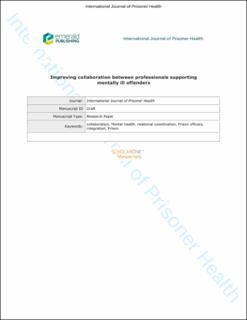Improving collaboration between professionals supporting mentally ill offenders
Peer reviewed, Journal article
Submitted version
Permanent lenke
https://hdl.handle.net/11250/3026360Utgivelsesdato
2017Metadata
Vis full innførselSamlinger
- Artikler [412]
- Publikasjoner fra Cristin [429]
Originalversjon
International Journal of Prisoner Health. 2017, 13 (2), 91-104. 10.1108/IJPH-12-2016-0072Sammendrag
Purpose Interprofessional collaboration is necessary when supporting mentally ill offenders but little is understood of these interactions. This paper explores prison officers’ perceptions of current and desirable levels of interprofessional collaboration (relational coordination – RC) to understand how collaboration between these systems can be improved. Design/methodology/approach Gittell’s RC scale was administered to prison officers within the Norwegian prison system (n=160) using an adaptation of the instrument in which actual and desired levels of RC are evaluated. This differentiates between prison officers’ expectations of optimum levels of collaboration with other professional groups, dependent on the role function and codependence, versus actual levels of collaboration. Findings Prison officers reported different RC levels across professional groups, the lowest being with specialist mental health staff and prison doctors and highest with nurses, social workers and other prison officers. Significant differences between desired and actual RC levels suggest expertise of primary care staff is insufficient, as prison officers request much greater contact with mental health specialists when dealing with the mentally ill offender. Originality/value The paper contributes to limited literature on collaborative practice between prison and health care professionals. It questions the advisability of enforcing care pathways that promote the lowest level of effective care in the prison system and suggest ways in which mental health specialists might be better integrated into the prison system. It contributes to the continued debate on how mental health services should be integrated into the prison system, suggesting that the current import model used in Norway and other countries, may not be conducive to generating the close professional relationships required between mental health and prison staff.
